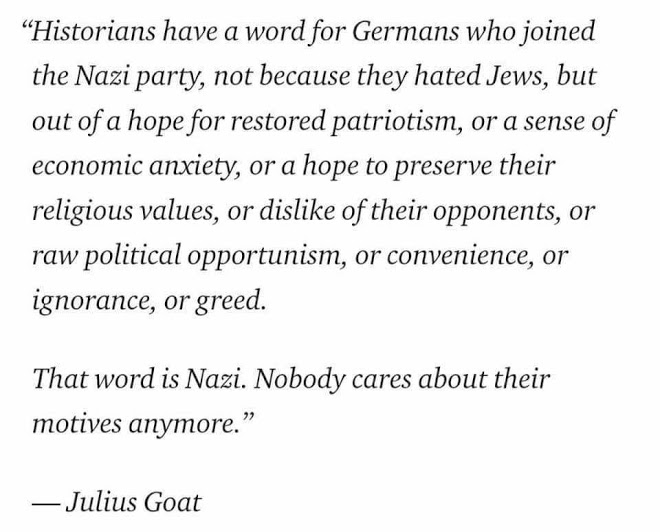One of my favorite WWII films is actually about the post-war period trying to come to grips with what happened during the war: Judgment at Nuremberg. A fictionalized account of the war crimes trials, it grapples in multiple directions with what happened in Germany to turn it into a nation that twisted the rule of law and human decency to commit atrocities against those they considered not worthy.
It’s in fact fascinating to watch those Germans, those Nazis, seek to defend themselves. Some are boldly proud of what they did (Werner Klemperer, himself a refugee from Nazi Germany, does a remarkable job here). Some play the “We didn’t know what was happening” or “You had to go along with it” cards. Some, faced with the horror of what they’d done, the moral compromises they’d made, try simply to assert that their motivations were good, even if the results awful.
In the end, all the excuses fail. They were all part of the Nazi state. The motivations don’t matter so much as the results of the regime they supported, explicitly or implicitly.
It’s a powerful lesson, and one that we could all use a reminder of now and again.
Originally shared by +Talina Christine:


Some lessons are so important that we should commit them to heart with vigor enough that we won't need reminders. Maybe that's too much to ask of us fallible humans across a span of decades.
Still, dum spiro, spero.
After one generation, what happened becomes history and the emotions start to fade.
+L Gorrie Which is why they still fly Confederate Battle Flags in the US South? Also the Middle East is nothing but conflicting accounts of My Great^19th Grandfather owned this olive orchard.
+John Poteet You are right, but I think that those emotions (the "Great South" ones) differ to the emotions felt by people involved in wars. The people now feel pride in something that they really do not understand. Those who lived through war, and in many cases their children, understood the lessons learnt. Following generations forget that and replace the knowledge with their own ideas.
There is no way that the feelings felt by the average "red neck" waving the Confederate flag around equate to those of people of the South immediately after the war.
Regarding the "Our Land" issue – That is ongoing and every generation on both sides is further entrenching the hatred and feelings of injustice. The same "war" has been going on for generations and is a different situation.